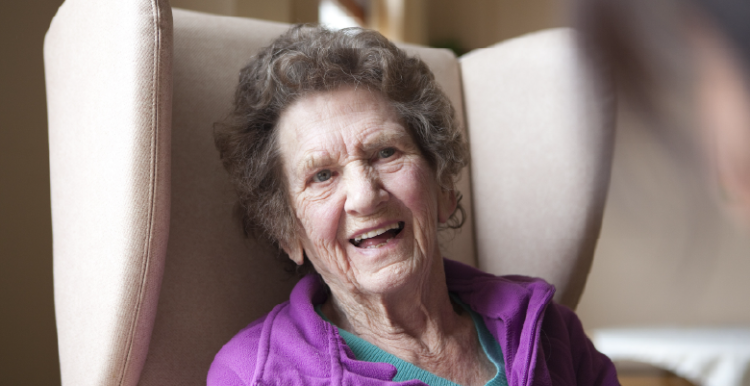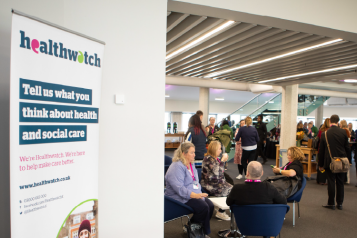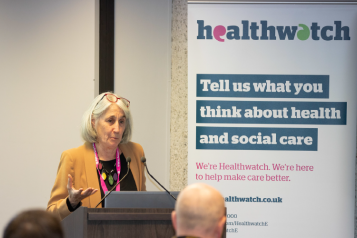Case study: Raising awareness of deconditioning syndrome

I am 96 years old and up until four months ago, I was living a very independent life. I enjoyed organising and taking a taxi to the hairdressers in Westbourne once a week and going out for lunch every day.
A devastating fall at home
On 5 April 2023, I had a devastating fall in my flat. I broke my left femur and was given a 4.5 hour operation in Poole Hospital to reconstruct my ball joint and upper thigh. The operation wasn’t entirely successful, and it was first thought that I would never be able to weight bear on that leg again. I was very traumatised by my fall. But after a month, I was X-rayed and advised that I would be able to start physiotherapy and weight-bearing.
Hospital planned to discharge Gladys without ongoing care in place
Sadly, at that same point, the hospital staff usurped the surgeon’s decision, and instead, told me that I was not suitable for physio, and decided they needed my bed, so asked me if I wanted to go home. They did not liaise with my son or his partner Fiona, who are my main care supporters, and both of whom visited me every single day in hospital. Subsequently, the staff nurse told Fiona and my son that I was going home.
Family had to push hard to get physio and a care home place
Fiona and my son then acted on my behalf, with my agreement, and advised that home was totally unsuitable for me and pushed to hold a meeting with the exit nurse, specifically requesting what I needed, which was physio and a hospital place to be made available.
The nurse was very rude to Fiona, telling her she was ‘patronising’ because Fiona disagreed with the process the hospital had put in place to stop me ‘bed-blocking’! Fiona was shocked and tearful about the way she was spoken to by the nurse, especially as Fiona is a retired registered sheltered housing manager with 20 years recent experience and good understanding of the Social Care Act.
Through my son and Fiona’s efforts, I was then offered a place in a Care South home with physio support. Fiona and my son were pleased that my needs would be met.
Hospital forgot medication in the discharge pack which led to complications
Poole hospital sent me to Alexandra Care home (Care South) but forgot to send my laxatives with me and I ended up with a blocked bowel for a week. It was extremely uncomfortable; I was unable to eat, and was very nearly returned to hospital because of it. Fiona says it was very remiss of Poole Hospital to forget my laxatives as all care homes are unable to provide medication.
Gladys lost weight, became weak and ‘deconditioned’
I lost weight and went down to five stone. I was unable to do physio while my bowel was blocked and during the time I was recovering from my weight loss because I was very weak. The care home worked hard to feed me and help me gain weight and get my strength back. But sadly, during this time, I reached the stage where I was told that I was bed-ridden (deconditioning syndrome). My son and Fiona knew how active and independent I was before my fall and would not accept the bed-ridden label I was given.
Physio and family worked to help Gladys regain strength and independence
My son asked Fiona if she would help me regain my ability to walk, and I was glad to work with her to regain my independence. My physiotherapist, Chloe, immediately was happy and helpful to co-work with Fiona, and within five weeks of intense daily exercise of 1-1.5 hours a day from Fiona, and brilliant help and support from Chloe, I am at the stage, where today (21 July 2023), I was able to walk across my room with Chloe’s help and a Zimmer frame. This is a major breakthrough for me, and I am elated that I will be able to go home and regain most or all of my independence.
People need help to walk again, rather than be labelled and left as bedridden
I would like to raise awareness about deconditioning syndrome especially in older people, but also across all age groups. When people were in lockdown, everyone suffered some level of physical and mental deconditioning and de-skilling.
I know what it has meant to me to get my life and independence back, where I could so easily have spent the rest of my life lying in bed, with no access to a proper toilet or ability to even drink from a proper cup without a straw. There are so many people who could be helped to walk but are left bed-ridden. I want to help those people.
Raise awareness of deconditioning and train people to help
Fiona says that if the NHS raised awareness about deconditioning syndrome and trained relatives, or even a charity equipped with trained physiotherapy assistants, they could then provide daily support to help recondition those in need, and therefore so many more people could be helped to return to a life of empowered independence.
Fit and fighting to live a full and active life
I am so happy that I can have my life back – it has changed my mood considerably. I am now able to smile, have hope and think about things in a positive way. I am also far more able to think clearly and have happy conversations.
Everyone keeps telling me I am a miracle and what I have been able to do is so unusual, because most bed-ridden people end up staying in bed for the rest of their lives. Being in bed and reliant on others made me miserable and I just wanted to sleep all the time because I was so low. I had lost all my hope.
As a side note, the last time I was in hospital as an in-patient was over 60 years ago when I gave birth to my youngest son! I am on virtually no medication. I have never been a burden to the health service. I think it important for you to understand that. I’m 96, fighting fit and I want to live a full and active life until such time as I’m called upstairs!
Share your story
If you have a story to share that highlights how health and social care in Dorset can be done well, differently, or better, please get in touch; you can remain anonymous if you wish. We will use your experiences to raise awareness and to create positive change in Dorset’s health and social care services.
0300 111 0102


